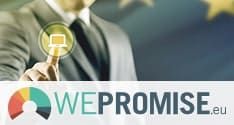
For a democratic, innovative and modern Europe, I have pledged to defend digital rights

I am proud to be the first EP-candidate to sign EDRi’s pledge for digital rights, The Charter of Digital Rights. The 10 elements of the pledge are important political goals in order to ensure a democratic, innovative and modern Europe.
1. I will promote transparency, access to documents and citizen participation
Democracy today is different than 200 years ago. We need to open up policy development to encourage citizen participation and real dialogue.
Citizens need to and have the right to be able to hold their authorities and politicians to account. In order to do this we need transparency and access to information.
2. I will support data protection and privacy legislation
Privacy is a fundamental human right, and is central to the maintenance of democratic societies. We need to be empowered in order to protect and control our own personal data. Data is a great source for innovation and development but needs to be used with respect to the people who’s data we access and securely. We need to trust the people we entrust with our data.
3. I will defend unrestricted access to the Internet and online Services
We need a free, open and neutral net in order to continue the revolution in information, freedom of expression and innovation that we have seen the last 20 years bringing social and economic benefits as well as being an enabler for human rights.
4. I will promote an update of copyright legislation
Copyright needs to suit the needs of the society we now live in. We need reform to allow the internet to bloom instead of allowing outdated business models to limit free market and to criminalize audiences.
5. I will not support blanket, unchecked surveillance measures
Security requires freedom and participation from the citizens. Surveillance must adhere to international human rights and adequately protect the rights to privacy and freedom of expression. Just because it is possible to monitor everything does not make it right nor does it enhance security. Societies built on the idea that less freedom is more secure are authoritarian regimes. Our society should be built on trust and partnership, not control and surveillance.
6. I will promote online anonymity and encryption
In order to ensure privacy as well as the safety and security of activists and opposition in repressive regimes, we need acceptance and promotion of online anonymity and encryption. Crime and terrorism is not stopped by more control but by prevention.
7. I will not support privatised enforcement outside the rule of law
Law enforcement should be done by authorities under democratic control, not by private companies with no obligations to citizens and society.
8. I will support export controls of surveillance and censorship technology
Surveillance and censorship is detrimental to democracy, security and human rights. We should promote development of democracy, security and human rights not allow European companies to make money on export of surveillance and censorship technology.
9. I will defend the principle of multistakeholderism
Today’s world is no longer controlled solely by states and limited by geographic boundaries. If states isolate themselves, they get out-witted by other stakeholders. Our politics and politics of the web should reflect this.
10. I will promote Free software (Open source software)
Open software allows for better software and more innovation to the benefit of users, authors and society.
Read more about the pledge on www.wepromise.eu
Kim Bach
Thanks! That’s great!
Was wondering if you, or people ypu know, might be interested in collaborating with Wikimedia Foundation on providing answers to the “European Commission copyright consultation”.
“The European Commission is considering modernizing European copyright laws. To get feedback and input on this modernization, the Commission has published a series of questions, and asked organizations (like ours) to answer them. This is an important opportunity to influence EU copyright laws, and therefore an important opportunity for us to influence the future of the free knowledge movement.
More background is available from the European Commission.
We’re putting the questions on-wiki so that we can collaboratively draft answers. This is an experiment, but we hope that the resulting answers can be submitted by the Wikimedia Foundation and other interested groups.”
Wikimedia: “European Commission copyright consultation” answer collaboration
karen
Yes as I wrote and told you elsewhere, but forgot here… I’d love to.